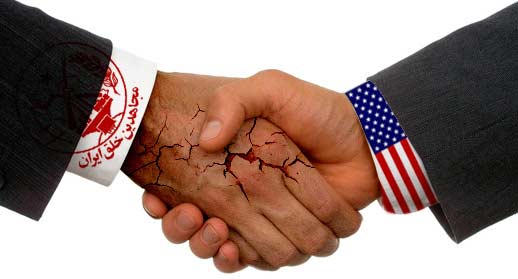|
“Let’s assume that Mujahedin-e Khalq, though it has long behaved as a terrorist organization, will now act more like freedom-fighter rebels, combating the Iranian regime without harming Iranian society, still supporting the group is likely to backfire and do more harm to U.S. interests than good,” wrote an associate editor at The Atlantic. |

Writing about the U.S. policy of supporting its enemies of enemies including the Mujahedin-e Khalq terrorists on The Atlantic's Web site, Max Fisher said many leading American officials want the U.S. to support MEK because they are an enemy of Iran, but the world is too complicated and interconnected for "the enemy of my enemy is my friend" to work as a foreign policy mandate, said a Sunday report published by Habilian.
“It leads the U.S. to work against its own long-term interests, "solving" short-term problems by creating bigger, longer-term problems,” added Fisher.
“For example: supporting Arab dictators to suppress the Arab Islamist parties that may soon take over, supporting Latin American rightist who ended up being murderous dictators, supporting anti-Soviet fighters who later turned against us, and so on.”
Max Fisher continues, “Still, let's assume, for the purposes of discussion, that American MEK enthusiasts are right in arguing that the radical Marxist group, which assassinated six Americans in the 1970s, has since become, and always will be, as American as apple pie. Supporting this terrorist group is still likely to do far more harm than good.”
“The U.S. has a long history of arming rebels, insurgents, and outright terrorists who want to fight our enemies for us,” he added. “Even when it works -- and it often doesn't -- the U.S.-sponsored fighters often spread small arms, exacerbate anti-American attitudes, and entrench a cycle of violence that can continues for years and sometimes spin out of control.”
He then made reference to Congress’ shoveling millions of dollars into CIA programs to support anti-Soviet fighters in Afghanistan that much of the guns and money by design went to the extremists, adding “even the Afghan extremists who didn't turn against the U.S. did use their arms and money to rampage across Afghanistan, sowing the chaos, violence, mistrust, corruption, crime, and poverty that has plagued the country for now 30 years.”
Fisher believes that even if Mujahedin-e Khalq, though it has long behaved as a terrorist organization, will now act more like freedom-fighter rebels, combating the Iranian regime without harming Iranian society, supporting the group is still likely to backfire and do more harm to U.S. interests than good.
In the end he concludes that there might be some short-term gains for supporting the MEK. “The group may have supplied valuable intelligence on the Iranian nuclear program and has been linked to the killings of Iranian nuclear scientists (though it's not clear if this actually does much good). “But the long-term effects, though impossible to predict, could be far worse.” “No matter which militant group we're supporting in what corner of the world, that history always seems to repeat itself.”
